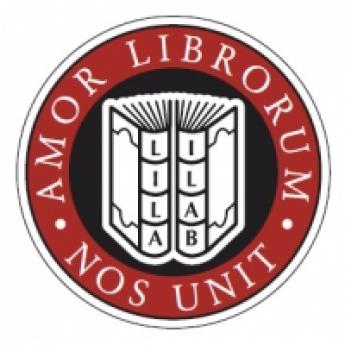Events
1948 - Copenhagen II
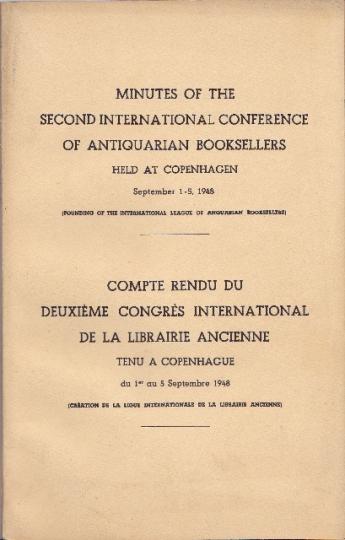
HELD AT COPENHAGEN
September 1 - 5, 1948
Mr P. H. MUIR (Great Britain) in the chair
BELGIUM
Mr. Fl. Tulkens
DENMARK
Hr K. V. BLOCH
Hr A. FREDERIKSEN
Hr Aage FRIIS
Hr E. GRØNHOLT-PEDERSEN
Hr Niels KAABER
Hr Gustav STRAND
ENGLAND
Mr D. MASSEY
Mr P. H. MUIR
Miss W. MYERS
FINLAND
Hr Ilmari JORMA
Hr Eric OLSONI
FRANCE
Mr F. de NOBELE
Mr A. POURSIN
HOLLAND
Mr A. L. van GENDT
Mr Menno HERTZBERGER
Mr K. JONGBLOED
ITALY
Dr E. AESCHLIMANN
NORWAY
Hr Baltzer BORSUM
Hr J. W. CAPPELEN
Hr S. ENGELSTAD
Fru Juddi STEENSEN
SWEDEN
Froken ASPINGTON
Hr Börje BORJESSON
Hr Axel BORJESSON
Hr G. RONNEL
SWITZERLAND
Mr W. S. KUNDIG
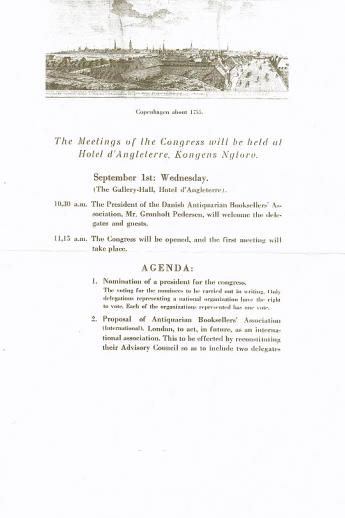
AGENDA
1. Nomination of a president for the congress:
The voting for the nominees to be carried out in writing. Only delegations representing a national organization have the right to vote. Each of the organizations represented has one vote.
2. Proposal of Antiquarian Booksellers' Association (International), London, to act, in future, as an international association.
This to be effected by reconstituting their Advisory Council so as to include two delegates from each existing national organization, the corporate body thus formed to have power to co-opt two voting delegates from the USA and also, if they think fit, representation from other countries where no association at present exists. The voting for this proposal to be proportionate to membership, one vote for every hundred members or fraction of one hundred.
3. Ratification of the decisions taken by the first conference held at Amsterdam in September 1947
a) Constitution of a committee
b) Seat of the secretary
c) Nomination of a secretary
d) The by-laws of the international body
e) General
4. Proposal of Syndicat de la Librairie Ancienne et Moderne, Paris, France
a) Examination of the possibilities of reducing the disadvantages of long delays in international payments. The possibility of an account payment on the placing of an order.
b) Confidential information-service concerning solidity.
c) Establishment of an international arbitration for settlement of disputes.
d) Publication of an international yearbook.
5. Proposal of the Nederlandsche Vereeniging van Antiquaren, Amsterdam, The Netherlands
a) List of bibliographical - and trade-words and expressions in different languages
b) Uniformity of description of the titles of book catalogues in the different countries
c) Catalogues and lists of members of national organizations only to be mentioned in trade papers like "The Clique", "Le Bouquiniste Français", "Das Antiquariat", etc.
6. General Business
INTERNATIONAL CONGRESS OF ANTIQUARIAN BOOKSELLERS
Held at the Hotel d'Angleterre, Copenhagen
1st to 5th September, 1948
Opening speech by the President of the Danish Association of Antiquarian Booksellers, Mr. E. GRØNHOLT PEDERSEN
Ladies and Gentlemen,
As President of the Danish Association of Antiquarian Booksellers, I have the pleasure and the privilege to welcome you to this International Congress, and to include a special word of welcome to those of you who have come from abroad - a welcome to Denmark - to Copenhagen.
Last year Holland took the initiative and invited antiquarians from all over Europe to attend a conference in Amsterdam. To this conference, in fact, the United States sent a special observer. The object of this important meeting was to consider the possibility of establishing an international organization for antiquarian booksellers, the need for which several of us had already begun to realize.
On that occasion Denmark was honoured by being requested to plan and arrange the second international congress where delegates from the different countries would be empowered to vote and decide on the question of establishing an international organization. And so, with your kind attendance and these words of welcome, we now open this Congress - this historic Congress - which, we feel, is going to mean so much to all antiquarian booksellers.
I am sure I can say, for all of us Danes who are occupied in the trade, that it is a very distinct pleasure to see assembled here today, delegates from every country possessing an Antiquarian Booksellers' organization. We take this as evidence of the importance of this Congress and the work which is going to occupy us in the course of the next few days.
I am sure all of us taking part in this Congress feel deeply grateful to the Dutch, whose initiative has made it possible for us to assemble here. Never before have so many antiquarian booksellers from so many different countries been called together to discuss matters of common interest.
It has rightly and frequently been said that trading in second hand books is an indispensable link in international co-operation. Cultural and scientific circles also acknowledge the significant part played by antiquarian booksellers and follow with interest the work we do. They will be interested in a still more effective co-operation of antiquarian booksellers all over the world. To strengthen the connection between the different countries, to raise the general standard of the profession and improve its efficiency in procuring rare publications, are matters of vital importance. This, briefly, is our aim. Though all the organizations have not a large number of members, their work benefits whole communities, often demanding disinterestedness of the bookseller and placing a responsibility on his shoulders.
The commodity we handle - the book - is, I daresay, about the most international thing on the world market. It is the support of the research worker and the scientist, the indispensable tool of the intellectual worker thirsting for knowledge. It satisfies the desires of all thinking and sensitive individuals. It is the inspiration behind new ideas, new deeds - and last, but not least, it fulfils a great mission in enlightening the masses. Our mission is to find the right book, preserve and finally convey it to wherever it is needed and can bring benefit or pleasure. A mission which, by its very nature, imposes upon us a responsibility which we must not neglect.
With these thoughts in mind, I am sure that our meeting and discussing of the various problems on the agenda of the Congress will bear fruit. We are not political groups serving any specific party. We will listen impartially to one another's ideas and opinions on the subject under debate. There can be no doubt of the possibility of bringing this Congress to a successful conclusion, provided each one of us is possessed of the kind of understanding and spirit which tends to break down national barriers.
Our purpose, our task, and our temporal welfare are things which are not necessarily irreconcilable - on the contrary, I should like to express the wish that during the whole Congress we may preserve a feeling of fellowship which alone can produce the positive results which each and every one of us is looking forward to.
Finally, I should like to say that even if in our country and in this city we still feel some of the after-effects of the war and are therefore unable to provide for you as we should have liked, I am convinced that all our guest will feel, not only that we - their colleagues - are naturally their hosts during their entire stay in Denmark, but that wherever they go they will meet with the same cordial hospitality. And so on behalf of the Danish Association of Antiquarian Booksellers, I should like to bid each and every one of you welcome to this Congress. I should also like to extend my hearty thanks to all, who by word and deed have helped to make this Congress possible and I hope, one which will cling indelibly to our memory.
MR. MUIR replied for the British delegates and thanked Mr. Grønholt Pedersen and the Danish Association for their welcome. He had left Holland last year with mixed feelings - gratitude for the wonderful time the Dutch had given them, and apprehensiveness for the time when the Congress would be held in London, because it would be so difficult to live up to the high standard set by the Dutch. He had been apprehensive for the Danes, too, for the task set them. He was sure, however, that Mr. Hertzberger would agree with him when he said that the Danes had been no whit behind the Dutch in preparing our welcome. Much was due to the great organizing ability of Mr. Friis, the Danish Secretary, and the speaker said he would like to give just one example of the thoroughness of his methods. When he arrived in Copenhagen on the previous Thursday Mr. Friis had met him at the station and Mr. Muir had said to him that the only thing needed to assure complete success was fine weather. "Yes", Mr. Friis replied. "But I have arranged that it will rain to-morrow and on Saturday, and after that it will be fine". And, sure enough, it did rain on Friday, and on Saturday, but not a drop had fallen since then.
We were all much touched by our reception here, he said, and we thanked our Danish hosts for the warmth with which we had been greeted. But, more than that, we thanked the Danes for Copenhagen itself - for Carlsberg and Tuborg, for the Tivoli, for Bellevue - everything, not only so delightful, but so new to us all - from the bottom of our hearts, we thanked them all.
MR. HERTZBERGER, speaking in Danish, also thanked the Danish Association for their invitation and welcome. He went on in English to quote Mr. Grønholt Pedersen's reference to the antiquarian book trade and said we were here to talk about all the things that will further our trade and raise the standard of the antiquarian bookseller, which he regretted had fallen very low in some countries. Mr. Muir, he said, had kindly made reference to the Congress in Amsterdam, and though he had come to Denmark with higher hopes than Mr. Muir, he could only endorse how hospitable he had found the Danes. Mr. Friis had also met the Dutch delegation and he had felt confident that with such good organization the Congress was bound to be a success. He thanked the Danish Association once again for their kindness.
MR. DE NOBELE, on behalf of the French Association, thanked Mr. Grønholt Pedersen, Mr. Friis and Mr. Kaaber for their hospitality, which he felt sure would foster cordial feelings in the five days of work ahead.
The delegates then adjourned to the Conference room.
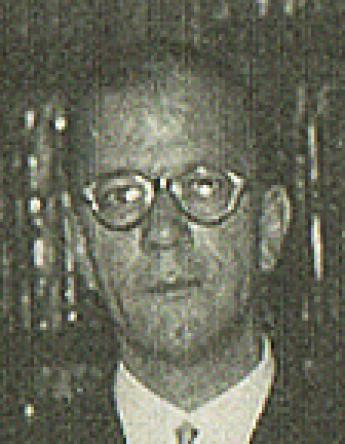
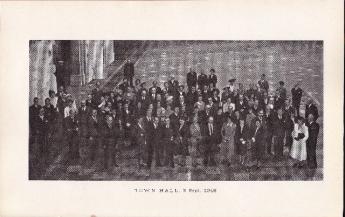
CONFERENCE
MR. GRØNHOLT PEDERSEN, President of the Danish Association, opened the Conference by saying that invitations to attend had been accepted by England, Holland, France, Belgium, Switzerland, Norway, Sweden, Finland and Italy. Unfortunately the Spanish and Austrian representatives had been prevented from coming owing to passport and visa difficulties.
The Danish authorities, he said, had co-operated splendidly in making the social side of the Conference a success, and they were deeply grateful to them and to the institutions concerned. As it would be a little awkward for them to make any alterations in the program arranged, he hoped everyone would accept them as they were.
Declaring the Conference open, he went on to say that the first item on the Agenda was the nomination of a President for the Congress, and he would like to suggest Mr. Muir, Mr. Hertzberger or Mr. Kundig for this office. Mr. De Nobele replied that the French delegation would like to see Mr. Grønholt Pedersen himself take the Chair. Mr. Grønholt Pedersen declined and a ballot was held, resulting in the election of Mr. P. H. Muir of the British Association.
On taking the Chair, MR. MUIR said, "Mr. Grønholt, Ladies and Gentlemen, I am deeply conscious of the signal honour you have done me in electing me to preside over the Conference for the second time. I am reluctant to do this as I think there should be a change, but, as it is your wish, I bow to it. May I suggest in opening the proceedings that we first of all honour our colleagues in all countries who have passed away, by standing for a moment in silence as a mark of our respect"
(Everyone stood).
Proceeding, Mr. Muir said, We have very little time before lunch and I think the second item on the agenda, the proposal of the British Association, will be difficult to dispose of. In order that delegates may have time to think it over I should like to read to you in full the resolution as it was sent out from our Association. It reads as follows:
In 1908 this Association, in response to applications for membership from all parts of the world, broadened its scope and assumed its present international title. For forty years it has carried out, to the best of its ability, the international implication of its title, and it was therefore with especial enthusiasm that it responded to the initiative of the Dutch Association to call an international conference in 1947.
We, the Antiquarian Booksellers' Association, are therefore fully seized of the important advantages to be gained from a deeper and closer liaison between the various national associations that have emulated our example.
We feel that this international spirit can best be fostered by the affiliation of other national associations to our own, thus preserving the continuity of international service which we have hitherto offered. To this end, we suggest that the Advisory Council of our Association be reconstituted so as to include two delegates from each existing national association, the corporate body thus formed to have power to co-opt two voting delegates from the USA and also, if they think fit, representation from other countries where no association at present exists.
We propose that voting powers on the reorganized Advisory Council be proportionate to membership, the delegates from each country to count one vote for every hundred members or fraction of one hundred. Thus, associations with one hundred members or less would possess one vote; those with between one hundred and two hundred, two votes, and so on.
The necessary finance to be provided in the same proportion at the rate of £ 20 (twenty pounds) per hundred members or fraction of one hundred. The Secretary of the Advisory Council to be the Secretary of the Antiquarian Booksellers' Association (Int.) for the time being, and the sum of £ 80 per annum to be the honorarium for Secretarial Duties.
I will not now detain you with any further discussion but these preliminaries will give you the opportunity to talk it amongst yourselves before we meet again after lunch.
HERTZBERGER. Before talking over the British resolution, there are five questions I should like to ask;
(1) Why does the British Association take up a different attitude from that taken at Amsterdam when the same President was in the chair?
(2) If the British Association is 'International' why was there a delay of two years after we had been freed from the war in promoting an International Conference, and why was it then left to the Dutch to take the initiative?
(3) The 'Advisory Council'. I have been a member of the British Association for 28 years and I can safely say that so far as Holland is concerned, no advice has ever been sought from the Dutch.
(4) Is it possible for one Association to be both national and international and what independent power of voting would the Advisory Council have?
(5) When we have to approach Government departments for certain purchases, it seems to me it would be better to speak in the name of an International Association instead of the Advisory Council of the British Association.
MUIR. Perhaps I may briefly reply to those points. To the first my answer must be that my attitude there, as a British delegate, was consistently to emphasize my lack of executive powers. You will see this if you consult the printed Minutes. All that I felt the Conference could do was to make recommendations which must be carried back to my own Association for discussion and ratification. The Conference had no power to bind any individual Association to its resolutions. At that time I was President of the Antiquarian Booksellers' Association, and, as soon as an opportunity offered, I submitted to my Committee a document embodying the resolutions of the International Conference. The Committee was unable to accept them, hence their counter proposals which are before you to-day.
The second question, why, if the ABA International had in two years done nothing for the welfare of antiquarian booksellers in other countries - no one regrets this more than I do. You all know something of the British character. They are rather shy and reluctant to intrude themselves on other people. Circumstances after the war were very difficult. We had a complicated house to put in order. We did not know what continental associations we should have after the war and we were very glad when Holland took the initiative, and we co-operated to the full in calling the Conference.
As for the Advisory Council - Mr. Hertzberger says it is a long time since Holland was approached. It is precisely because of the inadequacy of the Advisory Council as at present constituted that the Association has suggested that it should be entirely reorganized on more international lines.
Regarding his fourth point I should like to call your attention to the name of the British Association. I think that every other association incorporates in its title the name of its country of origin. The title of the British Association is the Antiquarian Booksellers' Association (International). It has never been, since 1908, simply a national association, but has catered for an accepted membership from booksellers all over the world. That is why our Committee suggests that the Antiquarian Booksellers' Association should continue to perform the international functions that it has always assumed, but that these should be widened and intensified. It is not due to national arrogance that the suggestion is made, but for the sake of the continuance of a tradition.
On the fifth point, that governments will take more notice of an international body than a national one, I should have thought the British resolution strengthened your hands, for governments would be asked to treat, not with an association newly formed, but with one that had already been in existence for over forty years.
We will now adjourn for lunch, and I hope the delegates will employ the interval partly by discussing among themselves the details of the resolution which is before them.
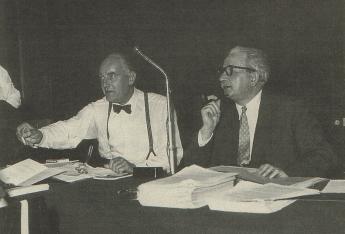
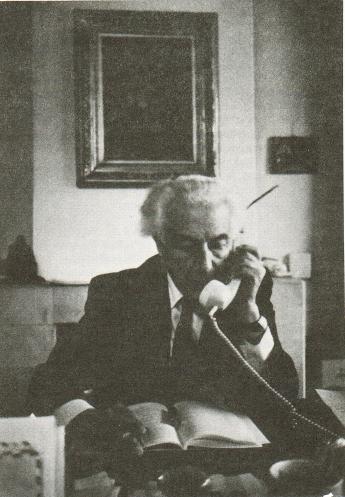
On the Resumption
MUIR. I should like to dispose to-day of items two and three on the agenda, and I should like them to have the fullest possible discussion; so that, while I do not wish to omit anyone from the discussion, nor to curtail any speakers, I do hope that you will make your contribution as brief as possible.
TULKENS. We feel that the point of view of the British Association ought to be presented by the President of the ABA rather than by the President of this Assembly.
MASSEY. I will be pleased to do that.
MUIR. Is there any question any delegate would like to address on the subject of the British resolution?
HERTZBERGER. I raised at the beginning of the Conference five questions to which I have only had negative answers. Since 1908 you described yourselves as an International Association but you must admit that internationally you have done nothing. In answer to my second question why you did nothing after the war to further the interests of our trade, you say you did not know which organizations existed abroad. In my opinion, if you really were an international body, it was your task to find out how the land lay. Surely you know one man at least in each country to whom you could have applied. With regard to my third question about the Advisory Council, you could have had advice from one man in Holland at least but will let it go. I think we need a new constitution. Your fourth point that you have never been solely national but international as well raises the question "Why has one never received notices of meetings in England?" Why was I allowed to lay before you my proposition regarding an international association? When you were at the last international meeting, as you rightly say, you had to go back to your committee, but on reading the minutes of the last meeting I see that it was decided that a meeting of the Presidents should be arranged to form an executive committee which would also nominate a secretary, etc., in order to make the second congress as easy as possible. Our President here was president of the Congress last year, let me read to you what he said then. "May I suggest that the most important thing is to get an international organization". From what I have read in the reports of your meetings, other members have voiced much the same opinion. Speaking for the Dutch Association, we think you do not fully understand the other nations. We do not agree that the British Association can be reconstituted to such an extent as to make them sufficiently aware of the needs of other countries and we fear that if the suggestion of reconstituting the Advisory Council is carried out the result will be much the same. At Amsterdam plans were made for an international association and were agreed upon by all countries present. Why should the British now obstruct these plans?
MUIR. I do not wish to reply as I want to comply as far as possible with your wishes, but as Chairman of the previous conference, I must call Mr. Hertzberger to order for attempting to place the blame on the British Association. This is entirely opposed to the facts. I will read you something I said last year which you will find on page 7 of the Minutes: "I must repeat that we are attempting to take too much upon ourselves. In accepting invitations to this Conference none of us has bound himself or his association to accept interference with its rules or methods of procedure. There are certain things we can do; there are certain suggestions that we can say at once with a large degree of assurance will be accepted and even enthusiastically accepted by our respective associations. But I feel sure that the kind of resolution towards which the present discussion is tending would be wholly unacceptable to my own organization, and that is such a resolution is made a condition of the formation of an international body not only will you not get what you desire in this respect, but you will thereby prevent the formation of any international body of any kind". This makes it clear that the resolutions of the Conference were not decisive, but were to be referred back to the individual associations for discussion and or ratification.
MASSEY. Mr. Hertzberger does not appreciate the fact that the British delegates may want to get some decisions ratified by their own Association. Their delegates have wide powers, but they reserve the right to take back to their Committee points bearing on matters affecting their Association's policy. Moreover the Advisory Council which we have in mind is not the same as that which Mr. Hertzberger envisages. Our present Advisory Council consists mostly of British and American members but the new one would be different, its members being representative of every association attending the Conference. Countries having no national association might also be represented on the Council. But, as I see it, whether you accept the British suggestion or whether you form an independent International Association any decisions that are made by such a body will have to be ratified by each country's national association. Another point which has been raised is that our Association, in spite of its name, is not international. I can only say to that that we have received many letters from our American members expressing their appreciation of the benefits they have received from the ABA.
HERTZBERGER. I have not had notices of meetings.
MASSEY. The Secretary says they have been sent to you.
HERTZBERGER. As I understand it the majority of your members were not in favour of an international organization, so I fear also that as regards international affairs they would not be in favour of an Advisory Council who were [which would be international].
MASSEY. Even if he were in favour a delegate cannot ratify without reference to his Association.
MUIR. The British President replies to this that the proposal of the Antiquarian Booksellers' Association means that a new Advisory Council of a truly international nature should be formed, consisting of delegates from every association represented here, with provision made for countries which have no organization. Mr. Massey also says that whether this suggestion is adopted, or whether it is rejected in favour of a new international organization, there is no escape from the ultimate control of national organizations. Surely the decision of an international organization would depend for their authority on their ratification by the separate organizations represented. An international organization would have no power to compel any national organization to accept rulings against its will. The validity of international rulings, therefore, depends ultimately on the acquiescence of member-associations, whichever form the new body takes. In other words, this difficulty is not peculiar to the British suggestion. I should like to hear from other delegates on this point.
DE NOBELE. The ABA's proposal cannot be accepted by the French delegates because it seems to us to be the extension of a national association, more than an international one. For instance, it seems certain that should such a proposal be accepted, the President of the international organization thus created could only be British.
We are contemplating a liaison committee with its own general statutes and regulations and we could not conceive that the ABA, however extended it might be, should admit that a president be chosen in France or elsewhere, while the new international association should remain - from a practical organization standpoint - strictly British. We do not think that a national organization could at the same time be an international one, as we understand it to be, as it would not seem possible to me to impart to an organization set up in this manner, the truly international spirit which we want to give it.
MASSEY. Does M. de Nobele mean president of the ABA or of the Advisory Council?
KUNDIG. In practice we do not see there is much difference between president of the Association or of the Advisory Council.
MASSEY. We have had an American president. It seems to me we might have a president from other countries.
KUNDIG. An international organization could have members of quite different countries but if under the British Association the majority of members would be British.
MUIR. The Advisory Council would consist of an equal number of members from each country and would deal with all international matters. There would be no majority of English members on that Council and it would elect its own President and there would be no obligation at all that it should be a British President.
KUNDIG. The ABA would send a delegate to this Advisory Council on exactly the same lines as other countries?
MUIR. Yes.
HERTZBERGER. I should like first to ask a point about the Advisory Council. Does the British Association make this distinction which has been put to us by Mr. Massey and Mr. Muir? If the British Association agrees to these details I really see very little difference between the two ideas. Why, in this case, cannot we have the international organization?
MUIR. Very well, if we are beginning to reach a rapprochement, if there really is such a very small difference, can we not accept the resolution?
FRIIS. Would the Advisory Council handle questions of international business or only of the British Association?
MASSEY. As I see it, the Advisory Council would make international decisions and if, say, Denmark objected, they could refer it back to their own organization.
FRIIS. No. The delegates of the Danish Association would have full powers and would not have to refer to members at home.
MASSEY. In most cases the British delegate would have a free hand, but it might so happen that he would now and then have to refer back to his own committee to have some point ratified.
KUNDIG. Speaking for Switzerland, our delegates would have full powers and it would be a question of tact. We might refer back on individual or general things, but on international questions our delegates would have full powers.
MUIR. I think there is some misunderstanding there. The British delegate is trying to make it clear that he can conceive circumstances in which a national delegate might ask leave of the Advisory Council to consult his national organization before agreeing to a certain decision. This would not be so in every case, or even in the large majority of cases. If he were the British delegate to such a body Mr. Massey thinks that in the vast majority of cases he would be in full powers to agree to the Council's decisions, but that, nevertheless he would have to reserve the right to consult his national committee in cases where he thought the Council's decision might be encroaching on national ground. This would be so whether the body were an Advisory Council or an entirely new international organization. It did seem that most other associations were prepared to give plenary powers to their delegates to decide absolutely and finally on the spot every matter discussed at international meetings. It looks, however, as if we are beginning to split hairs. It must be clear that the international body, whatever form it takes must have the power to pass resolutions, and it has the right to expect that those resolutions be respected and implemented by the national association represented on it. Unless the international body has that power it might as well not be appointed at all. Nevertheless, the British delegate feels that he can not pledge his committee to agree beforehand to any and every resolution that the international body may pass. But it should now be clear that the ABA is also out for a full international body and will give it every support if its resolution is adopted.
HERTZBERGER. I think there is a vast difference. Last year, with the exception of England, everyone had full powers and this year it is the same again. The British Association says that if the majority of an Advisory Council made a resolution, those who were in the minority should fall in with its decisions. Unless it was the British who disagreed. They it seems would have the right to refer back to their association. If there were an Advisory Council and if the majority of its members made a decision, and if the Dutch Association for instance were against it, I think they would go loyally with such a decision and would not refer it back to their own Association. This is the principal difference between the British Association and the others.
MASSEY. Exactly the same point arises in any question which has to be put to the vote. I can see quite clearly that some points will arise on which all countries cannot agree; if they are strongly opposed to an Advisory Council or whatever it may be called, they will not bow to it and would if they thought fit refer to their individual associations.
HERTZBERGER. I would like to quote from the Minutes of the Amsterdam Conference: (page 22) (1) that for the time being correspondence and general activity of the new international organization to be taken over by the British Association; (2) that a meeting be called of the Presidents of the various associations represented at this conference or any other association that may in the meantime be formed; (3) that they meet at some point still to be decided. Why has not the British Association fulfilled this task? Why has it not taken over the correspondence? Consequently one year has been lost.
MUIR. I think that is grossly unfair. A meeting was called and the Presidents could not come.
FRIIS. At the time we received the invitations we did not receive any agenda and therefore could not see why the meeting was called.
MUIR. I am sorry about that, but it was understood that the meeting of Presidents should be called and held in London. We arranged a skeleton program, but could not arrange a full program till we knew who would come.
HERTZBERGER. If I may refer again to the Minutes (page 7) the President said "The formation of an international body is eminently desirable. I feel sure that such a proposition would be unanimously ratified by all the existing associations". All the associations except the British did ratify it then. I cannot see that anything has been changed since last year. Since the meeting of the Presidents could not take place at that time why was not another meeting arranged?
KUNDIG. We don't see much sense in arguing. Call it what you like. You have heard the point of view of the French Association and ours. You can decide it now. Why not stop talking about it and vote?
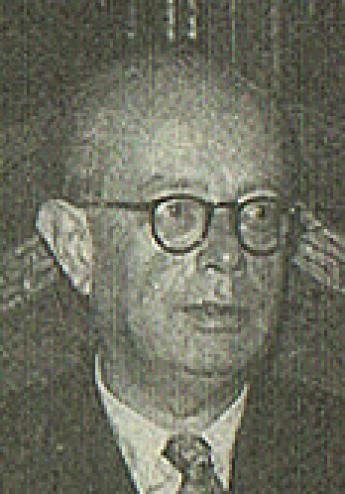
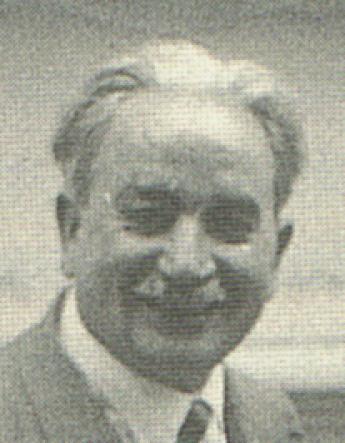
POURSIN. I am of the same opinion as Mr. Kundig. I think that we should appoint a Committee to be made up of several nations, and should draw up rules. It does not matter which country the President comes from. But we make a great point not only of the independence of the international body, but also of the individual associations. Each association must in our view, remain master in its own house. There are certain things that an international body can do which national bodies cannot do; but there are also certain things that an international body should not attempt to do, and one of the most important things it should not do is to attempt to interfere with the internal organization of any particular country. In this we agree with the British delegates: but we cannot agree to support their motion because we feel that the international body must be entirely free from and independent of any member body, and this resolution seems to us to imply not the formation of an international association but the affiliation of all other nations to one individual nation. That is unsympathetic to our ideas, neither do we think that it would be truly international in the way that we see it.
DE NOBELE. The French Association cannot vote in favour of the British resolution in its present form. Should other nations have any further proposals to make, we should be glad to check them immediately so that they may be studied and discussed and in order to see whether they meet with the general approval of the delegations present.
KUNDIG. Our Association also objects to any form of affiliation such as that suggested in the resolution.
POURSIN. I should like to sum up in a few words what I think results from our discussion. If I understood aright, the ABA offers to set up an International Committee for the antiquarian book trade. This Committee would be made up of members of each nation, and it would have to draw up the rules that govern the international antiquarian book trade, as well as deal with any questions that might arise in connection with this trade. The British Association wants each association to remain independent, and that, for ratifying the questions, a national delegate should be able to reserve the right to refer each individual case to his Association. If we understood aright, the Dutch Association, for instance, is of a different opinion, and wishes that it should be possible for the decisions to be taken by the International Association and applied to each contracting country.
In this respect, we are in complete agreement with the ABA. We think that an International Association should preserve the independence of each national union and that its activities should be confined to the issuing, not in most cases of hard and fast rules of conduct which would be compulsory in each and every country, but rather of rules of conduct which would be applied by each association, in all good faith, and as fully as practicable, taking into account in all cases the national contingencies. Further, in the case of an important issue, we do not think that an International Association should be allowed to return a majority vote, to be imperatively applicable to all countries, because if such a decision were made, against the firmly established opinion of a national association, the opposing country would very probably not apply it. It would therefore be highly desirable that the decision in question should not be made.
It seems to us that the independence of each country is essential, and we are in agreement with the British standpoint.
The proposed association would have its own separate budget, contributed to by each national union. We are also agreed on this point.
The president of the association may be of any nationality of all represented.
The Association will thus be a completely independent organization.
In this connection, we should like to ask our British colleagues, why, since we are agreed on most points as regards the setting up of an independent international organization, should it be wished to link it up with the existing British Association? We think, in view of the goodwill and the full understanding which we all have towards one another, that it should be possible to reach an agreement.
MUIR. I am sure you will all agree that the resolution has been fully and freely discussed. Nobody wants a snap vote, and I suggest an interval for general discussion among ourselves with a view to the possibility of framing a resolution acceptable to all. Unanimity is of the utmost importance here, and I hope and believe that it can be arrived at. We are not really so far apart as it might appear.
Adjournment
MUIR. The Interval has proved exceedingly helpful. There has been a general exchange of views and I think I can now put before you a resolution upon which you can agree unanimously. I will ask you to listen carefully to the proposal I shall now put before you, which I hope you will receive favourably. The British delegates have agreed to withdraw the resolution which is on the agenda in their name. In its stead I move from the chair the following proposal:
That this Conference do now adjourn to permit the Presidents of each national Association to meet and to draw up a constitution and rules for a new international body. I should like a further proposition as to the time and place of that meeting.
KUNDIG. Immediately.
MUIR. The purpose for which the Presidents are to meet is of such vital importance to the future of this Conference that it would seem advisable for them to meet here and now.
HERTZBERGER. Would you mind adding "Presidents of representatives?".
MUIR. Certainly. I will now put the proposal to the meeting.
RESOLUTION. That the Presidents of representatives of each association shall meet forthwith to draw up a formula and short bylaws for an International Association, which is to be entirely independent of any national organization. The powers of that committee and of the new international body shall in no way infringe the independence of any national organization (Carried unanimously).
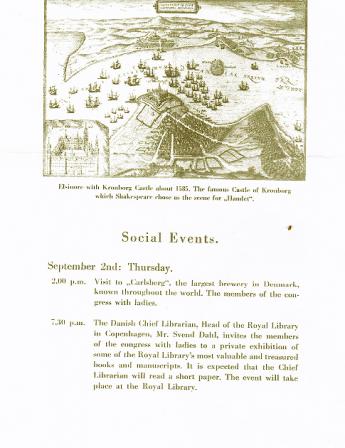
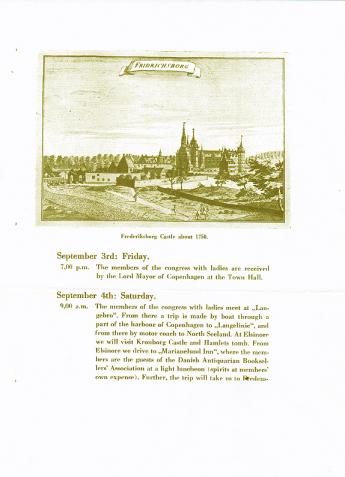
The President said that the third item on the Agenda was the ratification of the decisions taken by the first conference held at Amsterdam; but this would now be automatically delegated to the new organization which was being formed, and he therefore pass on to item 4, which was proposed by the French Association. He called upon M. de Nobele.
DE NOBELE. There is considerable delay in the receipt of payments from various countries. Sometimes it may be as long as from fourteen to sixteen months after the date of dispatching a book before payment is received. The normal delay, when conditions are favourable, is from three to six months. We are particularly unfortunate in France because currency is so unstable.
When a remittance is at last received, the amount quite often proves to be far below the price for buying back the same goods on the French market as well as on the international market, although the invoice has been made out in foreign currency and not in French francs; because, on the French market at least, the rates do not wait for deferred official devaluations, but they actually follow the curve of the falling money, in the opposite direction. If payment is made quickly, the 10% reduction that is generally granted to the trade can be allowed. But, if payment is delayed this reduction cannot be granted.
An ideal solution would be advance payment by return, after the pro forma invoices have been received. But this is possible only with certain countries, as there are governments (such as those of Argentina and of Holland) which do not authorize advance payments. Also, a general use of pro forma invoices might not suit foreign correspondents, who might regard such a measure as indicative of distrust towards them, and not as a safeguard of the bookseller's interests.
At all events, we are not very optimistic as to the possibility of improving this situation. We are quite aware of the fact that these are matters dependent upon the regulations in force in various countries, but we wanted to lay the problem before you, and should our new international association see its way to bringing its influence to bear on this problem, it would be helpful to all booksellers in soft currency countries, and particularly to the French.
There is also a conflict of opinion about whether goods in transit are the property of the seller or the buyer. We content that once a book has left the bookseller's hands it becomes the property of the buyer, and the responsibility for it becomes his. We should like to see uniformity of agreement on this point one way or another, so that we know where we are.
HERTZBERGER. Holland has found a way out about payments. Booksellers who imported before the war now receive an allocation of foreign currencies for several countries. We know, therefore, exactly how much we can spend in each country for a whole year. But we cannot pay against pro forma invoices - only against receipt of goods, but then we can pay at once. I would suggest that the proper departments in each government should be approached so that this system could be extended to other countries. This should be a task for the International Association.
DE NOBELE. It is evident that no general solution is available at the present time; but perhaps the International Association can arrange something.
Our second point is the need for more confidential information. Since the war there have been a number of mushroom firms growing up and some of us have suffered from the disappearance of buyers before they have paid what they owe. We think that the Committee of each association should supply the International Association with regular information about unreliable people in their own country, and a black list of these names should be prepared and circulated to all members. In France it is not possible to send information by post stating that anyone is a bad payer; it brings one within the law. But I believe that this can be done in Switzerland and I suggest we should take advantage of the fact. If such a list were the only achievement of this conference it would have justified itself.
KUNDIG. That is quite true. There is no law against the issue of a black list in Switzerland and we would be perfectly prepared to do it.
A general discussion of this point followed, with delegates explaining the situation in their respective countries.
Mr. Hertzberger mentioned a special difficulty in Holland, where some booksellers ordered from abroad in perfect good faith, and then found themselves unable to pay because they had no license. Sometimes they ordered without a license hoping to get one afterwards; but the conditions on which licenses are granted in Holland are clearly laid down by the government, and some of these booksellers will never get one. Other delegates suggested that the list should not be confined to trade names, but also to notorious private buyers. Libel difficulties were raised; but finally it was generally agreed that a method could be found of issuing the list from Switzerland, and the International Association was asked to find ways and means of preparing the list. Mr. Friis added that it would also be of great assistance to know how to secure payments from abroad where buyers were able but reluctant to pay their bills.
DE NOBELE. Our third point is, perhaps, more for future than for present discussion. We would like to have some method of arbitration to settle international disputes. There is no method of dealing with such disputes at present, and, although it would probably be impossible to appoint a tribunal whose decisions would be accepted as binding in all cases, it would be something to have the machinery by which such a tribunal could offer its services. The very existence of such a body would help to smooth the way in international disputes - disputes, that is to say, between booksellers of different nationalities.
Our fourth point is the desirability of an International Year Book, which should contain the latest information on the financial arrangements in the various countries relating to imports and exports, and all that concerns international relations between booksellers. Most of the things we have missed for lack of an International Association would be supplied in such a year book. We think it might also contain the lists of members and the bylaws of each national organization. It would be invaluable to have this information readily available in one own's country, and national associations would be able to increase their services to members if they could supply them with this information immediately on request.
THE PRESIDENT suggested that this would be a suitable point at which to adjourn the general meeting of the conference, so that the Presidents, or representatives of the various countries might meet to draw up a constitution for the new International Association. This was agreed and the meeting adjourned forthwith.
THURSDAY, SEPTEMBER 2nd, 1948
MUIR. My first task this morning is a very pleasant one. It consists in announcing to you that the Presidents have come to unanimous agreement on the draft which we appointed them to draw up yesterday for a constitution and rules for a new International Association. I shall now read the minutes of the Presidents' Meeting.
Minutes of the meeting of the Presidents
or Representatives of the Antiquarian Booksellers
Associations. September 1st, 1948
Present: - The Presidents or representatives of the following countries:
England Mr. D. Massey
France Mr. de Nobele
Switzerland Mr. W. S. Kundig
Denmark Mr. Grønholt Pedersen
Norway Mr. B. Borsum
Sweden Mr. G. Ronnell
Belgium Mr. F. Tulkens
Holland Mr. M. Hertzberger
Finland Mr. I. Jorma
Mr. W. S. Kundig, President of the Swiss Association, was unanimously elected Chairman of this meeting.
The following proposals were made to be brought before the general meeting the following day.
1. That the international organization should be called "The International League of Antiquarian Booksellers".
2. That the League should co-ordinate all aims and ideas for the benefit of the Antiquarian Book Trade.
3. That the League be constituted of all the national associations of the various countries. Countries without an association can be invited to send representatives as observers to international meetings.
4. That each country should have one vote (Mr. Massey, the English President, disagreed and reserved his decision until the next morning).
5. That an Executive Committee should be formed and consist of President, Vice President, Treasurer and two other members each selected from a different country. It was further decided that the Officers should be selected from England, France, Switzerland, Holland and Denmark.
6. That a Committee meeting be held once a year; and otherwise as circumstances require. In the case of members of any association requesting a meeting of the Executive Committee, this would be granted providing 50% of the Committee agreed.
7. That the Executive Committee as constituted should remain in office for three years and that its meetings he held in the country of the President subject to financial restrictions at present in force in some countries.
8. That the expenses of the International League should be paid by the League and that funds be provided in proportion to the number of members of each national association (Mr. Massey objected to the latter suggestion on the ground that he considered votes should also be in proportion to the amount paid).
9. That the Secretary be supplied by the country of the President in office.
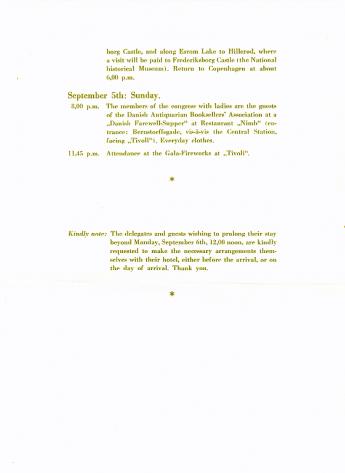
Those are the proposals made by the Presidents, and I think it will be convenient if we discuss each of them in turn, although I am sure there will be little to add to them.
The first two proposals were carried unanimously without discussion.
MUIR. I presume that observers appointed from countries without a national association would have no voting power (This was agreed and added to the third proposal). Now on Proposal N° 4 you will observe that a reservation was made by Mr. Massey. I think the difficulty has now been solved and that Mr. Kundig is prepared to tell us what the solution is.
KUNDIG. The compromise we propose is that each national association should have one vote for its first 150 members, and one extra vote if its membership exceeds 150. Thus, all associations with 150 members or less would receive one vote; associations with more than 150 members to have two votes; but no association to have more than two votes. This also affects Proposal 6, which is concerned with finance. We now propose that each country should pay one contribution for each vote. Some countries will be prepared to advance funds with which to carry on until contributions can be collected.
FRIIS. How about small countries like Finland?
KUNDIG. There will be some special cases which will have to be dealt with on their merits. We realize the impossibility of getting funds from countries which have no funds.
FRIIS. Would it not be possible to agree that countries with associations consisting of less than fifteen members should not be called upon to pay?
KUNDIG. I could not agree to that. Some countries with only fifteen members may quite well be able to pay.
HERTZBERGER. But we need a proposition on this…
MUIR. Surely we can leave the solution of these points to our Executive Committee. They will know the circumstances in the smaller and impoverished countries and we can trust them to find the right solution to such problems as these.
I should like one think to be made quite clear to you all. In the endeavour to find a solution on a basis of no taxation without representation the Presidents have been scrupulously careful to prevent the International Association from being swamped by the votes of one or two large countries. On the one hand it has seemed to them fair that the countries with large memberships should be called upon to pay more than the smaller countries; but precisely and exactly because their representatives speak for a much larger number of booksellers, it has also seemed fair that they should have a larger voice in the decisions of the International body. This compromise means that Britain and France will each pay double contributions to the funds and will each receive two votes. Ten countries are already represented, with voting power, and so it would never be possible for these two countries, by joining together, to command a majority of the votes available. I will therefore now submit to you Proposal N° 4 in its revised form. It now reads:
Each country shall have one vote for 150 members or less; countries with more than 150 members to have two votes. (This was carried unanimously)
MASSEY. Proposal N° 5 is a little ambiguous as it stands. I suggest that we add the words "for the first term". (The proposal, with this addition, was carried unanimously)
MUIR. I feel sure there is a misunderstanding in Proposal N° 6. It surely means that agreement for a special meeting of the Executive would be needed from 50% of the whole membership of the League. I think this is implied by the proportion suggested; you cannot have 50% of a membership of five. (This was agreed, and, with this amendment the Proposal was carried unanimously).
DE NOBELE. Proposal N° 7. We feel that the venue of meetings should be changed as often as possible, so that the conference delegates can become acquainted with many different countries and their members.
MUIR. The Proposal calls for the holding of the meetings in the country of the President, during his term of office. This appears to mean that the meetings would be held in the same country, three years running.
MASSEY. There seems to be some confusion about the meaning of the Proposal. The meetings to be held in the country of the President are the Executive Committee meetings, not the general conference. At least, that is what I understood it to mean.
KUNDIG. Yes, that is so. The conference should certainly be held in a different country each year, so far as possible.
VAN GENDT. Would it not be possible to choose this Committee at this meeting.
MUIR. Yes, I hope so. It is agreeable that the meetings of the Committee shall be held in principle in the country of the President (Agreed).
Proposal n° 7 was amended by the addition of the words "in principle" and passed unanimously.
Proposal n° 8. This proposal links with Proposal n° 4.
This proposal was amended to read, " … and that funds be provided equally by each association; but that associations with more than 150 members shall pay double" and passed unanimously.
Proposal n° 9. KUNDIG. This means a professional secretary to be paid for by the League.
FRIIS. I can see that a secretary is necessary, but will it be a full time secretary?
KUNDIG. No, only when necessary.
Proposal n° 9 was passed unanimously.
Proposal n° 10 was added and passed unanimously as follows:
That an international conference be held annually; if possible each year in a different country.
MUIR. These are admirable resolutions which will enable us to start work at once if we can elect the officers and committee of the League.
Nominations for officers then took place as follows:
HERTZBERGER. The Dutch Association would like to propose Mr. Kundig of Switzerland as President.
MUIR. I would like to second that from the Chair, but first I should like you to vote the proposals as amended as a basis for the constitution of the League (Carried unanimously).
Mr. Kundig was then unanimously elected first President of the International League.
KUNDIG. I thank you very much for my country and for myself and I will do everything in my power to fulfill my duties.
Mr. Muir then aced for nominations for Vice President.
DE NOBELE. We should like to have someone from the Antiquarian Booksellers' Association.
HERTZBERGER. On behalf of the Dutch Association I should like to propose Mr. Muir.
MASSEY. I shall be happy to second that subject to ratification by our Committee.
Mr. Muir was unanimously elected Vice President.
MUIR. It will be a great pleasure and an honour to serve under Mr. Kundig.
TULKENS. I should like to propose Mr. Hertzberger for Treasurer.
HERTZBERGER. I regret I cannot accept owing to the financial restrictions in my country. Denmark is more free than Holland. It might be difficult to get contributions and pay them out again.
KUNDIG. I don't think that makes any difference. If the Treasurer is in Holland, the cash need not be in Holland. There are not many countries besides Switzerland, Portugal and Belgium that are free currency countries. The cash could remain in Switzerland.
Mr. Hertzberger's objections were overruled and he was unanimously elected Treasurer.
HERTZBERGER. Thank you for the honour. I too will be glad to serve under Mr. Kundig and Mr. Muir.
For the other two members, Mr. Massey proposed M. de Nobele, who declined the honour, asking that M. Poursin might take his place, and M. Poursin was unanimously elected. M. Tulkens then proposed that the remaining member be Mr. Friis, who replied that he was only the representative of his firm and according to the bylaws of the Danish Association it was the firm that was the member. He suggested Mr. Grønhold Pedersen should take his place, and Mr. Grønholt Pedersen was unanimously elected.
Following the formation of the Committee an offer was made by the Swiss Association to loan the necessary funds to start the work of the new organization, which was greeted with applause.
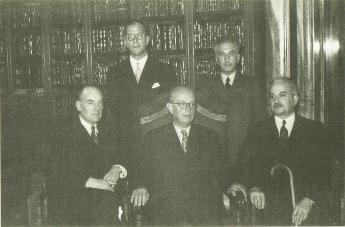
MUIR. We come now to the fifth item on the agenda, which stands in the name of the Dutch Association. Mr. Hertzberger.
HERTZBERGER. Our proposal (a). Before the last conference I had already been engaged in drafting an international dictionary of trade terms in several languages. I discussed the matter with Mr. Muir at Amsterdam and he agreed with me that this publication would be a very suitable task for the International Association. It is already prepared in draft form in Dutch, English, French and German; but it would be a good idea to add other languages, such as the Scandinavian. Descriptions in catalogues from abroad can be very confusing. Sometimes quarto means the format of the book, sometimes it means only that a large book is in question. Very few people are quite clear about the difference between calf and sheepskin; and when it comes to worlds like "Gamle" I guarantee that few people outside Scandinavia know the meaning of that word. The sale of such a list would surely cover the expenses of preparing it.
FRIIS. Mr. President, may I interrupt to suggest that at this historic moment, now that the new International League has been formed, we should adjourn for a time. The Press is waiting to be informed of the details (Applause).
(Interval)
MUIR. I am sure you all agree that an interval to mark this great occasion was fully justified. In the first place it has given us all an opportunity to celebrate; and secondly the Press has been fully informed of what has happened.
I should like all delegates present to realize their own responsibility in this matter. Spread the news in your own country and especially do all you can to persuade the Press that an event of great importance has taken place here. We all know how vital to each and all of us the International League is going to be; but a great part of its ultimate influence and importance is going to rest on its ability to convince government departments of that influence and importance. Governments can do a lot for us if they will; and governments are very sensitive to what appears in the Press. So do try when you return home to find ways and means of publicizing the formation of the new League, and especially on its international aspect. Antiquarian booksellers of ten European countries have met together here and have agreed to work for the common benefit of the trade as a whole. We hope, too, that one result of this conference, anode the formation of the League will be to persuade booksellers in countries where they have no national association to form one.
You will have no difficulty in persuading the press that this is big news; they will thank you for telling them about it. Make it as big and as wide a story as possible. If I can impress upon you the need for this I shall feel that I have adequately performed at least one part of my duty as President of this Conference.
Now may I return to what Mr. Hertzberger was saying before we adjourned. It seems to me essentially a duty for the League to remove stumbling blocks from the paths of its members, and certainly the language difficulty is one of them. All of us know some of the technical terms in other languages than our own, but he is a very wise bookseller who has never been pulled up short by some expression or other in a foreign catalogue, wondering what on earth it can mean. I was looking at a Danish catalogue myself last night and wondering what "orig. shirt" might mean. And then there are the abbreviations in common use. These are sometimes puzzling even to a cosmopolitan expert. So I hope you will agree to pass over to the Executive Committee the duty of preparing such a list as soon as possible. When we get it we shall wonder how we have ever managed without it. And don't forget that it will help trade, too; because booksellers who have been nervous of ordering from a foreign country, feeling that they were uncertain of the descriptions, will then be able to order with more confidence.
FRIIS. I think it will be of great benefit to all antiquarians if we have a list of expressions in other languages. I can quite understand that when you receive a catalogue from Denmark there may be words in it that you do not understand; and we Danes are prepared to do our bit to make the dictionary a success. But should the main words be expressed in English, and then translated into the other languages? Or how is it to be done? How can the different nationalities know how to find a word?
MUIR. I see Mr. Friis's point. To enable everyone to look up a word in any language represented in the dictionary it will be necessary to have as many alphabets as languages used. This is a question of machinery which must be solved by the editor. If we agree in principle the machinery can be arranged. But by all means let us have suggestions about difficulties of this kind which may not have occurred to the editor.
DE NOBELE. I suggested yesterday that the League might publish a Year Book, and I had it in the back of my mind that something of this kind might be included in it. But the dictionary has already been started, and the Year Book will take some time; so do not let the dictionary be held up for the sake of the Year Book.
HERTZBERGER. This leads me to section (b) of our proposals, which really follows on from what has been said. In Holland we describe books according to the Leiden rules. In this system, title, binding and price are described in that order, but in other countries they are arranged differently. I have seen the word "foolscap" following the title. I would suggest that there should be uniformity in this matter for all countries.
MUIR. If I may say so I think that is a counsel of perfection. We find a lack of uniformity, not merely between one country and another, but between one bookseller and another in the same country. Perhaps if and when uniformity is secured within each country it might be possible to proceed to international uniformity, but at present I think it is rather beyond our ability to attempt this.
Besides, with every respect, I would venture to add that the whole basis of this idea is quite different from the idea of a dictionary. In the first place, you are attempting to explain to each country the accepted practice and terminology of all the others - your function, in other words, is descriptive. Whereas, in attempting to tell others what they ought to do, and your function becomes didactic.
HERTZBERGER. If general rules are made they need not be used, but the opportunity to know about them would be given and it would be a step towards some kind of uniformity. Some dealers would be glad of guidance in this matter.
MUIR. If the League produces the Year Book that might very well contain an article by Mr. Hertzberger on the Leiden rules and their application to catalogue description. This might provoke a general discussion, and in that way we might gradually move towards some degree of uniformity. But I feel personally that the League should move very cautiously in relation to the possibility of interfering in internal matters of this kind. There is such a lot that it can do that will be gladly accepted everywhere, and that will take its officers all their time to carry out, that I think it should be wary of attempting to solve such problems as this at this stage of its existence.
FRIIS. In Denmark, we describe our books according to the title. Whenever we issue a catalogue the description of a book printed in German is given a German and an English description for an English book. If in making this dictionary it were done in this way, all the big libraries would have the benefit of such cataloguing. I think this would be the easiest way out of the question.
HERTZBERGER. I agree it should not be a resolution from the Conference but only put forward as a suggestion. I find librarians are not always able to follow the descriptions in booksellers' catalogues and if some uniform rules could be drawn up it would give them some help. I think, however, this could be left till a later date.
POURSIN. In preparing the dictionary, it should be remembered that this work is not to be just an ordinary dictionary, but that at the end of it one should find simple explanation for establishing the descriptions and for the use of the expressions. Such explanations would serve a guiding rules to booksellers in every country, so that fixed meanings should be attributed to all the technical expressions, which would then be used in accordance with these rules.
HERTZBERGER. Should such a list be available only for members and perhaps public libraries?
MUIR. I think that is the general feeling.
HERTZBERGER. Agenda 5 -c-. "Catalogues and lists of members of national organizations only to be mentioned in trade papers like "The Clique", "Bouquiniste Français", "Das Antiquariat", etc." This point was discussed last year. I still find to-day firms advertising in them which have bad names in all countries. Catalogues of certain people are still advertised in trade papers and sooner or later some of our members are going to make a loss through them. So I should like to insist that official papers shall be requested, on behalf of the League, only to take advertisements of members of Associations. Non-members should be excluded. The papers could be supplied with lists of members of the association or they should apply to the League to help them in the matter of advertisers. Perhaps the League should start a paper of its own.
MASSEY. I don't know if Mr. Hertzberger realizes that "The Clique" is a private paper run as a private concern. We have this very matter in hand. Non-members of the Association cannot be excluded by us from "The Clique" but we are trying to differentiate between the two.
HERTZBERGER. This time I am not referring to "The Clique", but it may be that when certain moral pressure is exerted "The Clique" would turn from a purely commercial point of view.
MUIR. In England we have nothing against certain people for integrity, etc. but there may be other reasons. We have all done business with them and they are considerable clients of Mr. Murray, yet they are not members of our Association.
HERTZBERGER. Advertisements should only be accepted from recognized firms who make it their living to sell books and not from, say, a doctor who likes to sell books as a side line. If the Dutch, for example, refuse advertisers because there is something against them, and yet such people are able to advertise in foreign papers, Holland gets the blame is something went wrong. That is what we want to avoid.
MUIR. That is best dealt with by closer co-operation between countries. If the Antiquarian Booksellers' Association passes the information from other countries on to Mr. Murray, it will be dealt with. We can hardly expect to arrive at anything here that will be adopted. We all want to exclude undesirable people and anything you can do to help will be appreciated.
POURSIN. The "Bouquiniste Français" is the organ and property of the Syndicat. We exclude completely the announcements of those who are not booksellers or those who do not quote prices. We exclude anyone who does not subscribe to the "Syndicat" so that they shall not profit by its advantages. There is another journal in France, "Books Wanted and for Sale", which has a small circulation. Thought is the object of the Syndicat that no one shall be allowed to advertise in their journal unless he is a genuine bookseller, it is hard to solve the problem of whether established booksellers, though not members, should be allowed to advertise. We decided therefore to accept advertisements from suitable booksellers who were not members as it is essential not to drive them to advertise in the rival paper and it also ensures some solidarity if all can advertise in one paper. We would also exclude from advertising any person about whom a foreign member complained.
MUIR. Assurances of this kind are the most we can hope for at this stage. In the meantime we must do our best to co-operate with the organs published in our respective countries to ensure that only established people advertise in them. The League exists to collect and supply the necessary information to the right quarter. It is up to all of you to see that the information is supplied.
TULKENS. What is being done in England about "The Clique's" subscribers?
MUIR. Mr. Murray is co-operating with our Committee to the fullest extent. He has agreed to supply them with a full list of all the subscribers to the "Clique", whether advertisers or not. The ABA have appointed a sub-committee who will circulate to all members in each part of England the names of the subscribers residing in their district with a request for reports whether these people are booksellers or not. Whether it can be shown that non-booksellers are receiving "The Clique" Mr. Murray has agreed to discontinue their subscriptions.
HERTZBERGER. I hope the Dutch section will be sent to Holland.
(Close of the meeting)
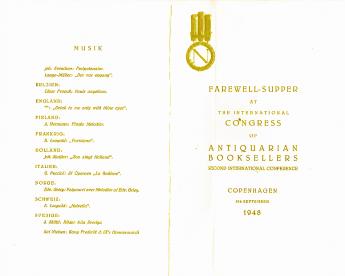
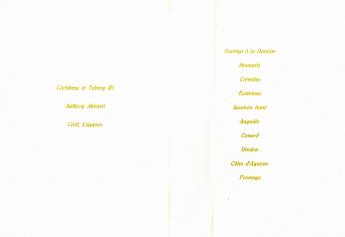
Friday, September 3rd, 1948
MUIR. I think we shall have a very short meeting as there is little business to be done. First it is essential that the international organization be supplied with further information of each national association, so I ask representatives to send to Mr. Kundig as soon as possible a list of their members, rules, by-laws, etc.
Secondly, I have asked privately and I now ask publicly, that for the archives of the League Mr. Friis and Mr. Grønholt-Pedersen will supply a copy of all the press notices, photographs and information which have been made at this Congress.
Thirdly, we have to decide on a venue for the next Congress.
MASSEY. I would like to suggest that the next Conference be held in London. My association would welcome it and on their behalf I invite all members of the League to London for the next Conference.
KUNDIG. I think it is a very fine suggestion, but I should like to leave it open until a final decision is made.
MASSEY. I am happy to agree to that.
MUIR. The procedure is that the International League will decide where the next Conference will take place, but Mr. Kundig as President takes note of the offer. I hope it will be possible to live up to the very high standard set by the Dutch and equalled by the Danes. Is is a tough proposition. I would suggest that we now close these proceedings so that the international officers may hold their first meeting.
MASSEY. I would be glad if the Executive Committee could decide to-day, if possible, where the next Conference will be held.
KUNDIG. It think it is a little premature.
MASSEY. I think a year's notice is required.
KUNDIG. We will talk about it at the first meeting.
MUIR. I am sorry that this last meeting is such a small one because I had hoped before bringing it to a close to express our heartfelt thanks to the Danes. I now call on Mr. Kundig.
KUNDIG. On behalf of all the associations represented here may I thank our hosts for all their amiability and for all the work they have done to make this Conference a success and to ensure the happiness of their guests.
(Great applause)
FRIIS. On behalf of the Danish Association, I can only say we have done the best we could, but we would have liked to do better. We are still suffering from the effects of the war, but when you come again we hope to do better.
(End of Conference)
ANNEXE
CONSTITUTION OF THE INTERNATIONAL LEAGUE OF ANTIQUARIAN BOOKSELLERS
INAUGURATED ON 2ND SEPTEMBER 1948 AT COPENHAGEN, DENMARK
President: Mr. W. S. KUNDIG (Syndicat de la Librairie Ancienne et du Commerce de l'Estampe en Suisse)
Vice-President: Mr. P. H. MUIR (Antiquarian Booksellers' Association International)
Treasurer: Mr. H. HERTZBERGER (Nederlandsche Vereeniging van Antiquaren)
Members: Mr. A. POURSIN (Syndicat de la Librairie Ancienne et Moderne), M. E. GRØNHOLT PEDERSEN (Den Danske Antikvarboghandler Forening)
STATUTES
1. The new international organization shall be called the "International League of Antiquarian Booksellers".
2. The League shall coordinate all aims and ideas for the advantage of the antiquarian book trade.
3. The League shall group together all the national associations of the different countries. Countries without an association may be invited to send representatives to act as observers at international meetings, but without the right to vote.
4. Each country shall have one vote for the first 150 members. Countries with more than 150 members shall have two votes.
5. An Executive Committee shall be elected to consist of a President, a Vice-President, a Treasurer and two other members all chosen from different countries.
6. The Committee shall meet at least once a year or when circumstances require. In the case of members of an individual Association asking for a meeting of the Committee, this must be agreed by 50% of the members of the League.
7. The Executive Committee thus formed shall remain in office for three years, and shall meet in principle in the country of the President in office, taking into account the financial restrictions at present prevailing in many countries.
8. The expenses of the International League of Antiquarian Booksellers shall be met by the League, and the funds supplied in equal parts by each Association, except in the case of Associations with more than 150 members, which will pay double.
9. The secretarial duties shall be performed in the country of the President in office.
10. An International Conference shall be held each year, if possible in a different country each time.
